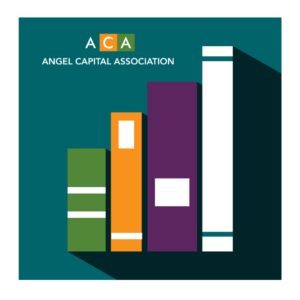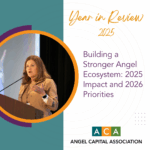Angel Insights Blog

Thursday, March 20, 2014
Accredited Platforms Are Not an Affront to Angel Group Investing
By: David Verrill, Hub Angel Investment Group, LLC & Chairman – Angel Capital Association
Noted New England entrepreneur and angel investor Ty Danco recently changed his method of angel investing away from the more traditional angel group process to AngelList. His thoughts were captured well in his interview on the Frank Peters Show in April entitled “Ty Danco, Throwing in the Towel”. Ty’s reasons were simple, he has his own growing startup that demands his time – making him more of a passive investor; he is happy to follow some of the most famous angel investors who are putting money to work on accredited portals in a highly curated fashion; and geographical diversification never hurts. By innuendo, Ty’s change cast a cloud on traditional angel investing through the group structure. It shouldn’t have.
Angel Groups are Growing
To further explore this topic, Christopher Mirabile (LaunchPad, ACA Board) and I were interviewed by Frank Peters in his subsequent show. Truth is, the number of angel groups has tripled in the last decade. There are three new groups in New England just in the last 12 months, and they vary in structure, sector focus, number of deals per year, etc. So something must be right – and a lot is. Angel groups are excellent at educating new angels; they are important filters for deals in their region; they promote best practices in standardized due diligence, deal terms and governance; they provide educational, social, and even employment opportunities. But the most important activity that angel groups provide is the work they do as active investors who spend huge amount of hours supporting their portfolios to help them to a successful exit.
But angel groups aren’t for everyone, and they aren’t the only player in an ecosystem that suffers from a lack of capital. We need to expand the number of investors in seed stage companies. There are nearly 8 million accredited investors in the US today, and only 5% of them participate in our asset class – and at $24 billion, it is an asset class.
Accredited Portals have a Role
Accredited portals are hopefully stimulating more accredited investors to become seed stage investors, and ultimately funding more companies. And angel groups can take advantage of this new, fast growing player in our ecosystem. The “syndicate” capability on all of the major platforms is a great opportunity for angel groups to use as a means of raising capital for their portfolio companies when they can’t, or the “Series A crunch” hits their otherwise perfectly viable portfolio company. Or some angel groups may choose to use a portal as the mechanism of funding their sidecar fund.
So rather than have an emotional reaction to portals as an affront to angel investing, let’s embrace the evolution of our marketplace and optimize how we (as angel group managers) can benefit from these changes to the benefit of our members and our portfolio companies.
On a final note, I’d like to thank Frank Peters for his many contributions to the angel ecosystem – not the least of which is the Frank Peters Show. Unfortunately Frank has decided to also “throw in the towel” on the show, but not before contributing some 435 valuable discussions that have stimulated untold entrepreneurs and angels. Thanks Frank, we’ll miss the show.
Tags:






